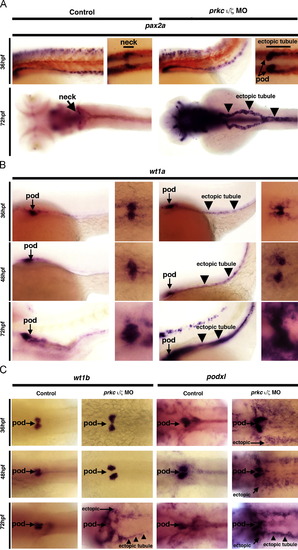
prkCI/? knockdown disrupts glomerular development and causes ectopic renal progenitor transcription factor expression. WISH was used to detect gene expression (purple) in wild-types (left column) and prkCI/? morphants (right column). (A,B) Left panels, lateral views; right panels, dorsal views; all embryos are shown with anterior to the left. (A) pax2a was restricted to the neck segment in wild-types, but showed ectopic podocyte and tubular expression (black arrowheads) in prkCI/? morphants at 36 and 72 hpf. (B) wt1a transcripts marked wild-type podocyte cells, but in prkCI/? morphants wt1a transcripts were also found in tubular cells (black arrowheads) and surrounding mesoderm cells. (C) wt1b and podxl were ectopically expressed in in prkCI/? morphants, though podxl showed ectopic expression beginning at 48 hpf and wt1b showed ectopic transcripts beginning at 72 hpf. Diffuse ectopic transcript expression (arrows) and ectopic tubule expression (black arrowheads) (dorsal views, anterior to the left).Renal clearance and PCT endocytosis are abrogated in prkCI/? deficient embryos. Embryos were injected with 40-kDa dextran?FITC at 48 hpf, and imaged at 72, 84, and 96 hpf. Control wild-type embryos displayed renal clearance by diminution of the net fluorescent signal intensity over time, as well as dextran?FITC internalization throughout the PCT (white arrows) during its progressive morphogenesis. Double prkCI/? morphants displayed severe fluid accumulation, notably pericardial edema that remained strongly positive for the dextran?FITC conjugate label, and the PCT was not labeled by dextran endocytosis (left panels, lateral views; right panels, dorsal views, with exception of bottom right which shows a lateral/dorsal angled view).
|

